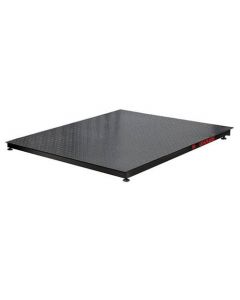In the bustling world of modern industry, efficiency, accuracy, and reliability are critical. One indispensable tool that supports these goals is the pallet scale. Widely used across various sectors, including logistics, warehousing, manufacturing, and retail, pallet scales provide an efficient way to weigh heavy goods and materials directly on pallets.
What Are Pallet Scales?
Pallet scales, also known as pallet jack scales or pallet truck scales, are designed to weigh goods and materials on standard pallets. These scales integrate weighing capabilities with the functionality of a pallet jack, allowing for the easy transportation and weighing of palletized goods in one seamless operation. They come in various configurations, including built-in pallet jack scales, portable platform scales, and floor scales.
Types of Pallet Scales
Built-in Pallet Jack Scales:
- These scales are integrated into a pallet jack, enabling operators to lift and weigh pallets simultaneously. They are highly mobile and suitable for dynamic environments where goods need to be frequently moved and weighed.
Portable Platform Scales:
- Portable platform scales consist of a flat platform that can accommodate a pallet. These scales are often used in situations where goods need to be weighed at different locations within a facility.
Floor Scales:
- Floor scales are larger, stationary units installed directly on the floor. They are designed for weighing heavy and bulky items and can accommodate entire pallets. They are commonly used in warehouses and manufacturing plants.
Uses of Pallet Scales
Pallet scales are versatile tools used in various industries. Some of their primary applications include:
- Inventory Management:
- Accurate weighing of palletized goods is essential for effective inventory management. Pallet scales help in tracking inventory levels, reducing discrepancies, and ensuring accurate stock counts.
- Shipping and Receiving:
- In logistics and distribution centers, pallet scales are crucial for verifying the weight of incoming and outgoing shipments. This ensures compliance with shipping regulations and prevents overloading.
- Quality Control:
- In manufacturing, pallet scales are used to weigh raw materials and finished products. This ensures that products meet quality standards and specifications.
- Production Processes:
- Pallet scales are integrated into production lines to weigh materials at different stages of the manufacturing process. This helps in maintaining consistency and accuracy in production.
Benefits of Pallet Scales
- Efficiency: Pallet scales streamline operations by combining weighing and transportation into a single step. This reduces the time and effort required to move and weigh goods separately.
- Accuracy: High-precision sensors in pallet scales ensure accurate weight measurements, which are critical for inventory management, shipping, and quality control.
- Cost Savings: By reducing manual handling and minimizing the risk of overloading, pallet scales help in preventing damage to goods and equipment, thereby saving costs associated with repairs and replacements.
- Safety: Pallet scales reduce the need for manual lifting and handling of heavy goods, minimizing the risk of workplace injuries and enhancing overall safety.
- Versatility: Available in various configurations, pallet scales can be used in different environments and for diverse applications, making them highly versatile.
Future Trends in Pallet Scales
As technology continues to evolve, pallet scales are also experiencing significant advancements. Here are some future trends to watch out for:
- Integration with IoT and Smart Systems: Future pallet scales will be equipped with IoT capabilities, allowing them to connect with smart systems for real-time data exchange. This will enable better inventory tracking, automated reporting, and remote monitoring.
- Enhanced Connectivity and Cloud Integration: Pallet scales will offer enhanced connectivity options, such as Wi-Fi and Bluetooth, enabling seamless integration with cloud-based inventory and management systems. This will facilitate centralized control and real-time access to weight data.
- Advanced Data Analytics: Incorporating advanced data analytics, future pallet scales will provide actionable insights into inventory levels, usage patterns, and operational efficiency. This will help businesses make informed decisions and optimize their processes.
- Improved Durability and Design: New materials and design innovations will make pallet scales more durable and capable of withstanding harsh industrial environments. Enhanced ergonomic designs will further improve ease of use and operator comfort.
- Energy Efficiency and Sustainability: Future pallet scales will be designed with energy-efficient components and sustainable materials, reducing their environmental impact. Battery-powered models with longer life spans will also become more common.
Also Read: The Ultimate Guide to Portable Scales and Their Benefits
Conclusion
Pallet scales are indispensable tools in modern industry, providing accurate and efficient weighing solutions for a wide range of applications. As technology advances, these scales are set to become even more integral to operations, offering enhanced connectivity, data analytics, and automation capabilities.
By investing in the latest pallet scale technology, businesses can improve their operational efficiency, accuracy, and safety, ensuring they stay competitive in an ever-evolving marketplace. The future of pallet scales looks promising, with innovations poised to revolutionize the way goods are weighed and managed in industrial environments.

